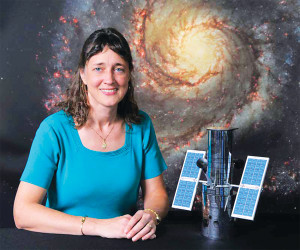On May 14, 2016, Houghton will welcome Jennifer Wiseman, an astronomer and author, as the commencement speaker for this year. During her time on campus, Wiseman will also having lunch with Houghton science students and faculty following commencement.
 Since her childhood, Wiseman has enjoyed looking into the night sky. She grew up on a farm in Arkansas and often stargazed with her parents. Today, through using radio, optical, and infrared telescopes, Wiseman researches the star-forming regions of our galaxy. She also directs the program of Dialogue on Science, Ethics and Religion (DoSER) for the American Association for the Advancement of Science, is the senior project scientist for the Hubble Space Telescope at the National Aeronautics and Space Administration (NASA), and is a fellow of the American Scientific Affiliation (ASA). Her interest in public science policy has led her to serve as a Congressional Science Fellow of the American Physical Society. As a fellow, she has worked with the staff of the Science Committee of the U.S. House of Representatives.
Since her childhood, Wiseman has enjoyed looking into the night sky. She grew up on a farm in Arkansas and often stargazed with her parents. Today, through using radio, optical, and infrared telescopes, Wiseman researches the star-forming regions of our galaxy. She also directs the program of Dialogue on Science, Ethics and Religion (DoSER) for the American Association for the Advancement of Science, is the senior project scientist for the Hubble Space Telescope at the National Aeronautics and Space Administration (NASA), and is a fellow of the American Scientific Affiliation (ASA). Her interest in public science policy has led her to serve as a Congressional Science Fellow of the American Physical Society. As a fellow, she has worked with the staff of the Science Committee of the U.S. House of Representatives.
“Dr. Jennifer Wiseman offers our graduates one model of what it means to live courageously ‘outside the box,’” said president of the college, Shirley Mullen. “At a time when science and religion are still too often assumed to be antagonists, she embodies a life shaped by deep commitments to both the methods of science and the claims of the Christian faith.”
While pursuing a degree in physics at MIT, Wiseman discovered the comet Wiseman-Skiff in 1987. She went on to earn a Ph.D. in astronomy in 1995 and continued her research as a Jansky Fellow at the National Radio Astronomy Observatory and as a Hubble Fellow at the Johns Hopkins University.
Through her written work, Wiseman has often addressed the relationship between astronomy and faith. She also shares her excitement about scientific discoveries as she speaks to civic clubs, churches, schools and campus groups. Additionally, the two groups in which she is involved, DoSER and ASA, seek to encourage dialogue between the fields of scientific discovery and religion. The ASA specifically seeks to integrate scientific research and the Christian faith and to create a safe space for the discussion of these topics.
Thomas Eckert ‘16 said, “The majority of students graduating are not physicists, nor even scientists, but I think dialogue between those in the arts and sciences is vital to a successful society.” He continued, “There seems to be a divide between the fields which can be bridged with careful listening and understanding by both parties. We are [all] explorers of this universe that God has placed us in. It is infinitely mysterious. Each of us takes part in the discovery process whether through the lens of a painting that may explore the intricacies of a grassy marsh or a theory that engages the simplicity of spacetime.” Eckert noted that he believes everyone will be able to relate to Wiseman, “I hope everyone listening at graduation can pay attention to similarities in their journeys with Dr. Wiseman’s life.”
